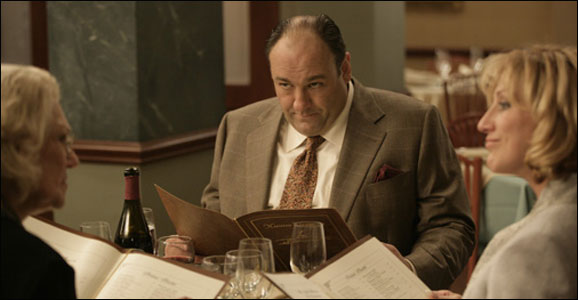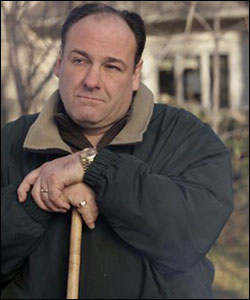Tony’s Last Supper: On The Sopranos
Tony’s Last Supper: On The Sopranos
The Sopranos and Politics

AFTER EIGHT YEARS as the ratings jewel of cable television’s HBO, The Sopranos is over. In contrast to the show’s January 1999 debut, which began with mob boss Tony Soprano (James Gandolfini) complaining about the world he had inherited and insisting that in his father’s day people took pride in their work, The Sopranos last episode, which outdrew every program in its slot with an audience of 11.9 million, was filled with ambiguity.
Tony, his wife Carmela, his son, A.J., and his daughter Meadow are at Holsten’s ice cream parlor in Bloomfield, New Jersey, for dinner, and as they get ready to eat, a series of menacing-looking figures loom in the background. Is Tony, who has just liquidated his New York gang rival Phil Leotardo, about to be hit? We never find out.
The last words are those of Steve Perry, singing “Don’t Stop,” from Journey’s “Don’t Stop Believing,” a song Tony has chosen to play on his table jukebox. Then the lights darken, the screen goes blank. The final episode is finished.
The disparity between the end of The Sopranos and those of such long-running, American television series as The Mary Tyler Moore Show and M*A*S*H could not be more stark. For those shows, closure was essential. In the final Mary Tyler Moore Show, Mary and her fellow workers, all of whom had been fired from their jobs at WJM-TV, Minneapolis’s lowest-rated station, cannot bear to let go of each other and remain linked together like football players in a team huddle as they leave their office. In M*A*S*H the doctors and nurses of the 4077 mobile surgical hospital make a point of letting one another know how much they matter in the midst of a war whose purpose they do not claim to understand.
In refusing to conclude The Sopranos with its main character meeting or escaping his day of reckoning, David Chase, the show’s creator and chief writer, was able to thumb his nose—as he had been throughout the series—at convention. To the very end, nobody could accuse him of playing by network rules.
And yet the finale’s ambiguity also guaranteed that David Chase’s choice of ending would anger fans and critics alike. After eight years, it seemed time for a decision on Tony Soprano’s fate. According to Yahoo Buzz, The Sopranos was the number one searched person or thing online for Monday and Tuesday.
 AT THE HEART of The Sopranos was the idea that Tony Soprano, a middle-aged New Jersey mob boss, faced in extremis the same kinds of problems confronting any driven businessman who believed success could only come from cutting corners. Unlike the executives of Enron or Tyco, Tony didn’t lie to stockholders or defraud the public. Though self-motivated and of dubious legality, he played by a set of rules, and it was precisely this set of rules that caused the FBI to be breathing down his neck.
AT THE HEART of The Sopranos was the idea that Tony Soprano, a middle-aged New Jersey mob boss, faced in extremis the same kinds of problems confronting any driven businessman who believed success could only come from cutting corners. Unlike the executives of Enron or Tyco, Tony didn’t lie to stockholders or defraud the public. Though self-motivated and of dubious legality, he played by a set of rules, and it was precisely this set of rules that caused the FBI to be breathing down his neck.
What made The Sopranos unique was that Tony struggled with balancing the legal and illegal sides of his life. He was never just another gangster. Brutality was his means to success, but behind this brutality lay a series of utterly rational decisions. Tony wanted to lead the good life and be treated as an accepted member of suburbia. He kept his palace of a house and its backyard swimming pool in meticulous condition, even raking the leaves himself. He sent his son to private school, and took pride in his daughter’s admission to Columbia University.
At issue in The Sopranos was whether Tony would ever decide that there was no reconciliation between his loutish and violent business practices and the genteel and suburban normalcy he craved. His panic attacks, and his therapy sessions with Jennifer Melfi suggested that Tony knew life was out of sync. The question for Tony and for viewers of The Sopranos was whether Tony would ever do more than flirt with his problems.
Melfi, guided by a colleague, finally decides that Tony is an incorrigible sociopath whom she has enabled with her therapy, and she drops him from her practice. But Tony does not take her judgment to heart, and, near the end of the last episode, we see him once again expelling his emotions—this time to his son’s psychiatrist. “I could never please my mother,” he explains. Left unanswered is whether Tony needs more time to change or simply wants an excuse to continue his bipolar social existence.
The Sopranos gives us no basis for reaching a solid conclusion one way or the other. But if we look at the television shows that have gained popularity in the wake of The Sopranos, there is every reason, on cultural grounds, to be pessimistic about the future that lies beyond The Sopranos. The new suburban hits, from ABC’s Desperate House Wives to Showtime’s Weeds, suggest that we live in world in which every variety of crime—from murder to selling grass—is compatible with the good life, and when we look beyond television to the state of American politics, the same contradictions exist with respect to the Iraq War, health care, and the outflow of American jobs. The pain these very real political issues cause has not led us as a nation to stop carrying on business as usual.
Like it or not, the contradictory—and complacent—existence of Tony Soprano is as emblematic of our turn-of the-century, post-September 11 era as the hard-working, suburban dads of Father Knows Best and Leave it to Beaver were for the Eisenhower fifties.
Martha Nussbaum takes on academic boycotts
Dissent remembers contributor Richard Rorty
Jon Wiener reviews four novels on the “Weatherman Temptation”
From the Archives: Stanley Plastrik on the Six Day War (circa 1968)
Michael Walzer on execution in an age of despotism
Arctic Jews: An interview with Michael Chabon
Robert Polidori photographs New Orleans
Nicolaus Mills is a professor of American Studies at Sarah Lawrence College and author of the forthcoming Winning the Peace: The Marshall Plan and America’s Coming of Age as a Superpower (John Wiley).
Homepage and featured photos courtesy of HBO.






